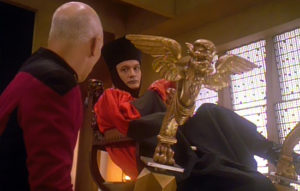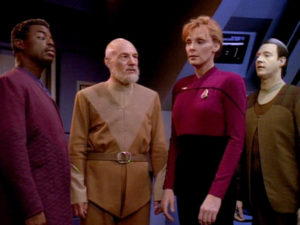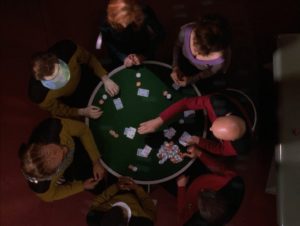Series Overview:
Thirty years ago, Star Trek: The Next Generation embarked on a journey that would solidify the popularity of a franchise, redefine science fiction entertainment, and take us on some incredibly cool, wholly memorable journeys. With so many great, genre-defining episodes it’s impossible to sum up the series in a handful of paragraphs. But despite being broadcast in an era where serialized storytelling wasn’t as prevalent as it is today, it’s the overarching story of TNG that allows us to examine it as a whole.
There’s such an enormity of great stories in The Next Generation (TNG) that one could write a thesis on most of them. [Check out “Trektember” over at Redeeming Culture for some great episodic reviews]. In discussing the series as a whole, however, I believe we find a road map in the crew’s dealings with Q, everybody’s favorite immortal jester in the court of Picard. His humorous yet insightful musings on human nature are the very essence of what Star Trek seeks to convey. Star Trek might be set amidst the idea of space exploration, but it is ultimately exploring who we are as human beings.
Space is not the final frontier. The first and last frontier we have to discover is ourselves.
So strap in, set phasers to stun, beam yourself up (ok I’m done) and follow us as we tackle TNG as best we can in a four-part series that examines the weaving story and the wondrous exploration experienced by the crew of the Enterprise NCC 1701-D.
Find all four parts here:
Part 1 – Encounter at Far Point and Human Nature
Part 2 – Q Who and The Nature of Calling
Part 3 – Tapestry and our Personal Natures
Part 4 – All Good Things… and Our Eternal Purpose
Part 4 – All Good Things… and Our Eternal Purpose
Q: Goodbye, Jean-Luc. I’m going to miss you. You had such potential. But then again, all good things must come to an end.
There are many reasons to both love and hate the internet. One thing that’s for sure in the love category? Star Trek: The Next Generation lives on forever. Seriously, has any other show had such an enduring effect on culture as this one? Little did my nine-year-old self know that saying goodbye to Picard and Q and the Enterprise-D when the finale aired back in 1994 was not really saying goodbye at all. Just see you later.
 Our final review of the series for the 30-year anniversary of its debut follows a similar vein to its finale All Good Things… in that it is both a look back and forward. Defining the entire series as one long trial that began with Encounter at Farpoint absolutely blew my little mind when I saw it for the first time. Past, present, and future colliding with stakes for the entire universe was no accident either. It’s almost a testament to the franchise. The writers were clearly aware that this Star Trek series would carry a lasting legacy. Man… is this the greatest series finale ever? It has my vote.
Our final review of the series for the 30-year anniversary of its debut follows a similar vein to its finale All Good Things… in that it is both a look back and forward. Defining the entire series as one long trial that began with Encounter at Farpoint absolutely blew my little mind when I saw it for the first time. Past, present, and future colliding with stakes for the entire universe was no accident either. It’s almost a testament to the franchise. The writers were clearly aware that this Star Trek series would carry a lasting legacy. Man… is this the greatest series finale ever? It has my vote.
It’s not just great because of its legacy. It’s also just excellent sci-fi entertainment. The episode is a masterful slow build, confident in its direction. Even though we know where it’s going, we take pleasure in every moment getting there. It honors the characters, even bringing back Tasha Yar, and lovingly pays homage to their journeys. Perhaps the best moment comes when Picard, in the past, encounters a still very naïve Data curiously pondering the common idiom “burning the midnight oil.” It’s humorous on its own, but powerful to see Picard delight in seeing his friend as his former self.
Q: The trial never ended, Captain. We never reached a verdict. But now we have. You’re guilty.
 The role Q pays in all of this is an important one. He’s the thread of overarching story in the series, and here he again embodies a cynical view of the possibilities of humanity. Guilty, he calls us. Incapable and inferior, and not even worthy of existence. But we know Q. That’s not what he really thinks. As always, it is his prodding and accusations that lead Picard to better himself. In a nutshell, that’s what Star Trek wants us to do- to look at the cynicism of the world telling us we cannot, and go forth and do it anyway.
The role Q pays in all of this is an important one. He’s the thread of overarching story in the series, and here he again embodies a cynical view of the possibilities of humanity. Guilty, he calls us. Incapable and inferior, and not even worthy of existence. But we know Q. That’s not what he really thinks. As always, it is his prodding and accusations that lead Picard to better himself. In a nutshell, that’s what Star Trek wants us to do- to look at the cynicism of the world telling us we cannot, and go forth and do it anyway.
I’ve heard it said before that we often confuse the supernatural for the spectacular. In other words, we think supernatural only includes things like mystical powers, resurrections from the dead, and ghosts that Beverly Crusher can fall in love with. In actuality, supernatural simply means “above what is natural.” In its most general definition it refers to that which is unexplainable by natural law. If we believe in the supernatural then, we simply believe in the unknowable possibilities that extend beyond what we know now. The basic mission of Starfleet is to chart this unknown. The basic calling of the Christian is to believe that all things are possible.
Q: You just don’t get it, do you, Jean-Luc? The trial never ends. We wanted to see if you had the ability to expand your mind and your horizons. And for one brief moment, you did.
Picard: When I realized the paradox.
Q: Exactly. For that one fraction of a second, you were open to options you had never considered. That is the exploration that awaits you. Not mapping stars and studying nebulae, but charting the unknowable possibilities of existence.
Why is this important? Because believing that anything is possible serves to affirm eternal theology and theistic belief. This gives life eternal weight, and when we have eternal significance it means that all life is sacred and what we do matters. Star Trek reflects this with the (somewhat flawed) principle of the Prime Directive. Actions matter to the lives and legacy of others. This is something Q had to continually learn throughout TNG, and as he did, he reminded Picard and us of the gravity of our place among the stars.
 The way I see it, Star Trek won’t ever end. A franchise so concerned with eternal significance has done its job to make an impression that will last long after the show itself ends. Whatever comes next will carry the spirit of Star Trek’s discovery with it. We need cinema like this to remind us of our worth. I highlighted the themes of TNG in the first three parts of this review series. Human nature, our calling, and our individual natures can all sit under the umbrella of eternal significance. For when we examine ourselves, ultimately what we find is eternal purpose. And that’s the most worthy trek of all.
The way I see it, Star Trek won’t ever end. A franchise so concerned with eternal significance has done its job to make an impression that will last long after the show itself ends. Whatever comes next will carry the spirit of Star Trek’s discovery with it. We need cinema like this to remind us of our worth. I highlighted the themes of TNG in the first three parts of this review series. Human nature, our calling, and our individual natures can all sit under the umbrella of eternal significance. For when we examine ourselves, ultimately what we find is eternal purpose. And that’s the most worthy trek of all.
Q: You’re not alone, you know. What you were and what you are to become will always be with you.



4 comments